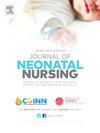Newborn resuscitation practices among nurses and midwives in Ghana
Q2 Nursing
引用次数: 0
Abstract
Background
Newborn resuscitation is critical for reducing mortality and morbidity among neonates with intrapartum complications such as birth asphyxia. Nurses and midwives are at the forefront of caring for newborns with birth asphyxia. Their behaviour, therefore, toward newborn resuscitation is critical to the newborn's survival.
Purpose
The focus of this study is to investigate the factors that influence the performance of newborn resuscitation practices among nurses and midwives in the clinical setting.
Design
and methods: A qualitative explorative, descriptive design was used with a purposive sampling technique to recruit a sample of Seventeen (17) nurses and midwives from two hospitals, in the Eastern Region of Ghana. Face-to-face interviews, using a semi-structured interview guide were employed for data collection. Thematic analysis was used to analyse the data.
Findings
The findings showed that good knowledge and understanding of newborn resuscitation had a positive impact on the attitude and behaviour of nurses and midwives. Again, people of referents and the family, including culture and religion, had a great influence on the performance of newborn resuscitation.
Conclusion
Factors such as lack of training, shortage of human and material resources, inadequate space, poor supervision, and monitoring were identified as direct and indirect barriers to newborn resuscitation performance among the nurses and midwives in the context of Ghana.
Practice implications
We recommend stakeholders and policymakers institute regular training, inculcating family-centered care in training, monitoring, and provision of the necessary amenities needed for effective newborn resuscitation to help improve the nurse or midwife's behaviours towards their practice.
加纳护士和助产士的新生儿复苏实践
背景新生儿复苏对于降低产前并发症(如出生窒息)新生儿的死亡率和发病率至关重要。护士和助产士是护理分娩窒息新生儿的最前沿。因此,她们的新生儿复苏行为对新生儿的存活至关重要。目的:本研究的重点是调查影响临床环境中护士和助产士实施新生儿复苏操作的因素:采用定性探索性描述设计和目的性抽样技术,从加纳东部地区的两家医院招募了 17 名护士和助产士样本。采用半结构化访谈指南进行面对面访谈,以收集数据。研究结果研究结果表明,对新生儿复苏的良好认识和理解对护士和助产士的态度和行为有积极影响。结论在加纳,缺乏培训、人力和物力资源短缺、空间不足、监管不力和监督不力等因素被认为是影响护士和助产士实施新生儿复苏的直接和间接障碍。实践启示我们建议利益相关者和政策制定者开展定期培训,在培训、监督和提供有效新生儿复苏所需的必要设施中灌输以家庭为中心的护理理念,以帮助改善护士或助产士的实践行为。
本文章由计算机程序翻译,如有差异,请以英文原文为准。
求助全文
约1分钟内获得全文
求助全文
来源期刊

Journal of Neonatal Nursing
Nursing-Pediatrics
CiteScore
2.00
自引率
0.00%
发文量
143
期刊介绍:
Aims & Scope: This is the practical, bimonthly, research-based journal for all professionals concerned with the care of neonates and their families, both in hospital and the community. It aims to support the development of the essential practice, management, education and health promotion skills required by these professionals. The JNN will provide a forum for the exchange of ideas and information between the range of professionals working in this field; promote cooperation between these professionals; facilitate partnership care with families; provide information and informed opinion; promote innovation and change in the care of neonates and their families; and provide an education resource for this important rapidly developing field.
 求助内容:
求助内容: 应助结果提醒方式:
应助结果提醒方式:


